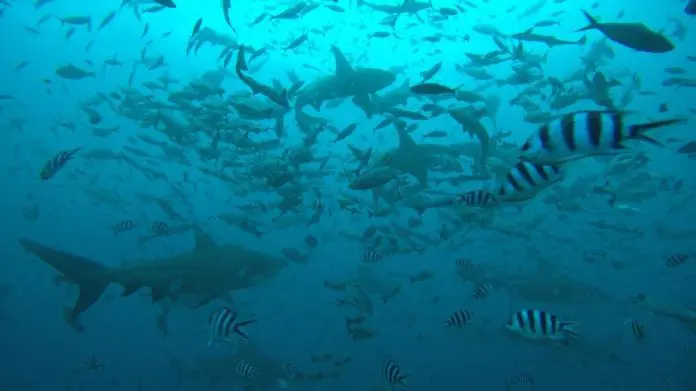There are a variety of shark dives around the world for divers to enjoy, offering the chance to get up close and personal with different shark species. Whilst some people have concerns that baited shark dives can impact natural shark behaviors, shark diving can be done responsibly with minimal impacts on the sharks. It is also a valuable yet underappreciated conservation tool that contributes to the protection of sharks and the ocean in a variety of ways.
How Does Shark Diving Contribute to Conservation?
Marine Reserve Fees Support Conservation Initiatives
Some of the best shark dives in the world are within marine reserves and visitors support these reserves directly by diving there and paying marine park fees. Marine reserves help protect fisheries, coral reefs, and ocean biodiversity from the impact of human activities and climate change, plus they provide unique study environments.
Marine-park fees are often used to educate communities and tourists about issues such as sustainable fishing and shark conservation, whilst also providing local subsidies to preserve reefs.
Shark Diving is A Conservation Education Tool
Shark dive operators and crew are passionate about their work and make the most of the opportunity to educate guests from around the world about the plight of sharks and shark conservation. The combination of guests seeing a shark in the water and then learning about the plight of sharks and ways to help conserve them is a powerful catalyst for change.
Shark Diving Supports Local Communities
Other benefits of shark diving are the opportunities the industry brings to local communities. Shark diving tourism is estimated to be worth more than $25.5. million AUD annually to Australia’s economy, thanks to its cage diving and whale shark diving opportunities, whilst the Bahamas, a popular destination for tiger shark and hammerhead shark diving, receives $113.8 million USD each year from shark diving activities.
Shark diving is a valuable industry and is particularly important to remote communities who may otherwise not receive such income to boost their economy.
Shark diving also creates local employment opportunities, such as for local dive guides, plus income for associated businesses including hotels, restaurants, tourism activities and local crafts.
All of which makes sharks a valuable economic asset, alive rather than dead, and provides a strong incentive for communities to protect their shark populations.
How Can Divers Choose A Responsible Shark Dive Operator?
As with choosing any diving operator, one of the first things to look for when considering choices is customer reviews for the vessel. A series of positive reviews is a great starting point to see if an operator is responsible and committed to offering the best experience. Those operators with good reviews and service are also likely to use best practices when conducting shark dives.
Dive forums are another great way to find out more about different operators and ask for recommendations for eco-conscious vessels.
Responsible shark diving operators take precautions to minimize the chances of their dives affecting sharks behavior, such as minimizing the use of bait and chum wherever possible, and ensuring the sharks are treated with respect and consideration during the dives.
If it isn’t clear from what operating procedures are being used, speak up and ask what their baiting and dives involve, and what they do to contribute to shark conservation. Most operators will be proud to share their knowledge and their environmental credentials.
America’s Shark Boat MV Horizon offers Guadalupe liveaboard diving with great white sharks and is a great example of an operator doing all they can to promote shark conservation to guests and protect the environment. They spend time discussing shark conservation with their guests during each safari, offset 100% of their diesel fuel in a carbon offset programme, collect trash at sea, contribute to environmental research, and review their environmental policy each year. They are one of a number of dives operators working hard to minimise their impact on the environment and preserve sharks for future generations.
Where Can Divers Go Shark Diving?
There are great shark dives around the world and some of the top shark dive destinations to explore are:
- Galapagos Islands: Galapagos sharks, large schools of scalloped hammerhead sharks, silky sharks, whitetip reef sharks and whale sharks.
- French Polynesia: Grey reef sharks, hammerhead sharks, blacktip sharks, silky sharks, occasional tiger sharks and silvertip sharks.
- Costa Rica: Schooling scalloped hammerhead sharks, whale sharks, blacktip and whitetip reef sharks.
- Bahamas: Tiger sharks, great hammerheads, lemon sharks, Caribbean reef sharks, bull sharks
- Malpelo Island, Panama: Numerous hammerhead sharks, silky sharks, Galapagos sharks, whale sharks and whitetip reef sharks.
- Fiji: Bull sharks, tiger sharks, whitetip reef and blacktip reef sharks.
- Guadalupe Island, Mexico: Great white sharks
- Djibouti: Whale sharks
- Malapascua, Philippines: Thresher sharks
Feature Photo by Stephan Whelan

